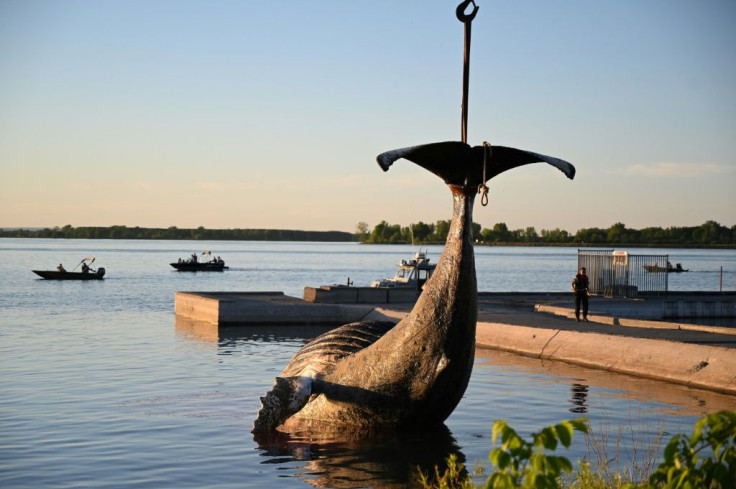Baby Humpback Whale Entangled In Shark Drum Line Freed After 5-Hour Rescue Operation
KEY POINTS
- Baby humpback was four meters long and about two months old
- Not sure if the juvenile would survive the "traumatic" incident, Dr. Olaf Meynecke said
- Five entangled whales were freed from Queensland coast this year
A baby humpback whale was freed from a shark control drum line following a rescue operation which lasted five hours. Two other whales waited not too far away while the juvenile was being rescued.
The four-meter long mammal was found trapped off Point Lookout at North Stradbroke Island, off Brisbane, Australia, on Sunday morning.
A specialist marine animal rescue team was dispatched to the scene Sunday morning after authorities received reports of a baby whale entangled in a "shark control drum line."
"A Queensland Boating and Fisheries Patrol marine animal release team arrived around 10.45 am and, with assistance from Sea World and the shark control program contractor, successfully freed the four-meter whale," a Fisheries Queensland spokesperson said in a statement, Brisbane Times reports.
The whale was freed just after midday, the authorities said.
The rescue mission took place while two adult whales, thought to be related to the juvenile, patiently waited for the baby humpback. They were located not too far away from the scene.
The juvenile could be as young as two months old, Griffith University whale expert Dr. Olaf Meynecke told ABC News. He said one of the whales that waited could be the calf's mother.
"They have a very strong bond between the mum and the calf, which lasts up to three years," Dr. Meynecke told the outlet. "The mother would never leave the calf. The other whale is likely not the father but an escorting whale who is there for support."
"I am not surprised there are more incidents happening over the last few weeks, there is footage showing up every day of mothers and newborns."
Even though the rescue operation was a success, Dr. Meynecke said he’s not sure if the baby humpback would survive for long.
"It's quite traumatic for the animals, and we don't really know what the impacts of the stress are on the animals," he said. "It's extremely distressing. They have the same fear of drowning as we do, so they try everything to stay on the surface."
"It's not only stressful for the calves but for the mother who is trying to save her calf but not able to do anything about it," he added.
Shark drum lines or baited hooks cause fewer entrapments when compared to traditional nets, Dr. Meynecke said.
"It's time to replace nets with drone surveillance and drum lines with the tagging of sharks," he said.
This incident adds to the list of several other similar occurrences reported this year on Stradbroke Island.
Two whales -- an adult and a calf -- were freed in June after they got trapped in shark nets off the Gold Coast.
Marine scientists and conservationists have been requesting the authorities to remove the nets, at Gold Coast and Sunshine Coast beaches, during the migration period, which extends from late-Autumn to Spring.
"More than 35,000 whales pass along the Queensland coast during the annual migration season and there have been only four release operations this year – resulting in all five entangled whales being successfully freed," the fisheries department said.
However, the government focuses on prioritizing human lives and said it would be working closely with scientific groups on shark control issues.

© Copyright IBTimes 2025. All rights reserved.





















